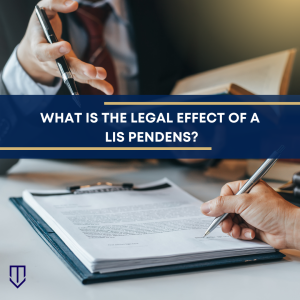 Lawsuits that affect interests in real property, such as partition actions, often require courts to adjudicate competing claims regarding who should have title to or possession of real property. In general, courts adjudicating such disputes follow the principle of “first in time, first in right.” Under this principle, “a conveyance recorded first generally has priority over any later-recorded conveyance.” (First Bank v. East West Bank (2011) 199 Cal.App.4th 1309, 1313.)
Lawsuits that affect interests in real property, such as partition actions, often require courts to adjudicate competing claims regarding who should have title to or possession of real property. In general, courts adjudicating such disputes follow the principle of “first in time, first in right.” Under this principle, “a conveyance recorded first generally has priority over any later-recorded conveyance.” (First Bank v. East West Bank (2011) 199 Cal.App.4th 1309, 1313.)
An important factor that courts consider when adjudicating cases affecting interests in property is whether each party affected by the court’s judgment had notice of the litigation or judgment. A judgment affecting title to or possession of real property that is recorded imparts “constructive” notice to a subsequent transferee or encumbrancer. When recorded, such judgment is effective against any subsequent conveyance or encumbrance, regardless of whether the parties to that judgment receive notice about the subsequent conveyance or encumbrance. (Civ. Code, § 1214.)
In contrast, a judgment that is not recorded with the recorder’s office of the county in which a property is located does not impart constructive notice to subsequent transferees or encumbrancers of the property. Any such judgment generally is not binding on a subsequent transferee or encumbrancer who acquires and records an interest in the property without notice of the prior litigation or judgment. (Civ. Code, § 1214.)
 California Partition Law Blog
California Partition Law Blog


 Generally, a co-owner of real property may commence an action in a partition. Owners of an estate of inheritance, a life estate, or an estate for years who hold such interest concurrently or in successive estates may seek to
Generally, a co-owner of real property may commence an action in a partition. Owners of an estate of inheritance, a life estate, or an estate for years who hold such interest concurrently or in successive estates may seek to 
 Following the explosive split between the two stars in the hit reality show, “Vanderpump Rules,” many are left wondering what will become of the couple’s $2.2 million dollar home. Prior to their split, Ariana Madix and Tom Sandoval bought a farmhouse-style home in 2019 and took their time to renovate the Property into their dream home.
Following the explosive split between the two stars in the hit reality show, “Vanderpump Rules,” many are left wondering what will become of the couple’s $2.2 million dollar home. Prior to their split, Ariana Madix and Tom Sandoval bought a farmhouse-style home in 2019 and took their time to renovate the Property into their dream home. 
 Yes, although the tenant is not allowed to exclude the non-consenting owners. The reason for this is grounded in ancient legal doctrine regarding the “right to possession” that all co-owners of property share together. Each owner may exercise this right, and each may grant it to a third party, should they so choose, even without the consent of the other owners.
Yes, although the tenant is not allowed to exclude the non-consenting owners. The reason for this is grounded in ancient legal doctrine regarding the “right to possession” that all co-owners of property share together. Each owner may exercise this right, and each may grant it to a third party, should they so choose, even without the consent of the other owners. 
 While it may not be obvious, a sizeable portion of the work that real estate agents and realtors do is court-ordered. Real estate law is a massive field, and often, the disposition of litigation results in the court forcing the sale of a property, be it a business, home,
While it may not be obvious, a sizeable portion of the work that real estate agents and realtors do is court-ordered. Real estate law is a massive field, and often, the disposition of litigation results in the court forcing the sale of a property, be it a business, home,  An action for accounting is an equitable action seeking to determine the amount owed to the parties of an action when damages are uncertain. “An accounting is an equitable proceeding which is proper where there is an unliquidated and unascertained amount owing that cannot be determined without an examination of the debits and credits on the books to determine what is due and owing.” (
An action for accounting is an equitable action seeking to determine the amount owed to the parties of an action when damages are uncertain. “An accounting is an equitable proceeding which is proper where there is an unliquidated and unascertained amount owing that cannot be determined without an examination of the debits and credits on the books to determine what is due and owing.” ( A deed of trust is a commonly used mortgage document in California. Essentially, a deed of trust provides a lender with security for the repayment of the loan and effectively functions
A deed of trust is a commonly used mortgage document in California. Essentially, a deed of trust provides a lender with security for the repayment of the loan and effectively functions